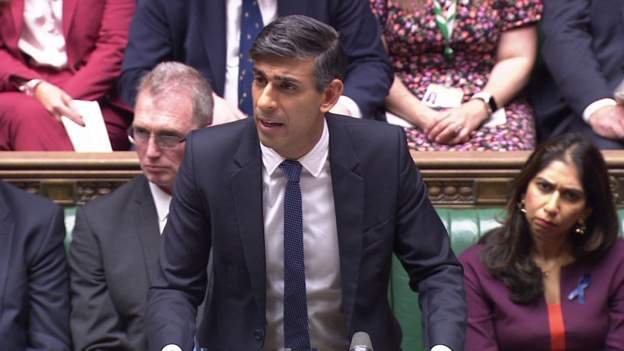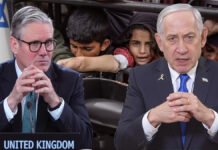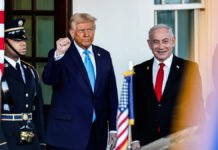Gaza’s Humanitarian Crisis: US and UK’s Controversial Stance
Around the world, calls for a ceasefire are intensifying as a response to the escalating violence in Gaza, which has resulted in the loss of countless Palestinian lives and a growing humanitarian catastrophe.
Israel’s far-right government has ordered extensive airstrikes, causing widespread devastation and pushing the death toll even higher, with fears of an impending ground invasion. The situation is not only taking a heavy toll on Palestinians but also raising concerns about the potential for further conflict across the Middle East.
Yet both the US at the UN and the UK at home have opposed calls for an immediate ceasefire in Gaza, arguing more time is needed for diplomacy and the return of Israeli hostages held by Hamas. However, this rationale overlooks the rapidly escalating humanitarian catastrophe facing Gazan civilians.
The United States exercised its veto power at the UN Security Council, blocking a draft resolution that called for a humanitarian ceasefire in besieged Gaza.
The brief resolution, proposed by Brazil, condemned the terror attacks in Israel on October 7, which were carried out by Palestinian militant group Hamas and resulted in over 1,400 casualties. It also urged the release of hostages taken during the attacks and called on all parties to abide by international law while safeguarding civilian lives in Gaza, which is under Hamas control.
The resolution further emphasised the need for “humanitarian pauses” in the ongoing conflict to facilitate the delivery of aid.
While twelve of the council’s fifteen members supported the resolution, the UK and Russia abstained from voting, and the United States vetoed it. US Ambassador to the UN, Linda Thomas-Greenfield, explained that the US preferred to give its on-the-ground diplomatic efforts more time to yield results, which had previously delayed the voting process.
She also criticised the resolution for not explicitly mentioning Israel’s right to self-defence, a point later echoed by the British representative, Barbara Woodward.
The Security Council’s failure to reach a consensus on a joint statement regarding aid and civilian protection left several members expressing disappointment and frustration. UN Ambassador to Brazil, Sergio Franca Danese, expressed his disappointment, lamenting that the council had once again failed to adopt a resolution, emphasising that silence and inaction were not in anyone’s long-term interest.
The French representative, Nicolas de Rivière, also expressed deep regret over the rejection of the text, stressing that Israel’s right to self-defence and the protection of civilians, humanitarian access, and adherence to international humanitarian law were not contradictory principles.
Following the Hamas attacks, Israel launched airstrikes on Gaza and stopped the supply of essential resources such as food, water, and electricity to its two million inhabitants holding the people under siege. Over 3,000 Palestinians, including many children, have already died in Israeli airstrikes.
The justification of forgoing a ceasefire while pursuing hostage releases seems morally questionable when it enables an open-ended bombing campaign that guarantees further innocent deaths.
If truly valuing lives on both sides, intensive diplomacy paired with an immediate ceasefire appears the only ethical path forward. Otherwise, the futile cycle of retribution will continue indefinitely, demanding endless blood sacrifice.
Urgent action grounded in compassion, not bellicose rhetoric, is needed to halt the growing toll of casualties. The living deserve more than being offered up to satisfy the ghosts of ancient grievances.
As George Orwell wrote, “There is something wrong with a regime that requires a pyramid of corpses every few years.” While Hamas’ actions cannot be condoned, collective punishment of civilians is immoral and illegal.
Not the right time to ask for a ceasefire – Sunak

Meanwhile Downing Street said on Wednesday it was not the right time to call for a ceasefire in Israel and Gaza while Hamas still held hundreds of Israeli hostages.
During PMQs, SNP Westminster leader Stephen Flynn asked Mr Sunak if he would join calls for an immediate ceasefire.
In response, the prime minister said Israel had “a right to defend itself”.
“We believe that Israel does have a right to defend itself, to protect its people, and to act against terrorism and ensure that the awful attack that we’ve seen from Hamas cannot happen again,” he told MPs.
“Unlike Hamas, the Israelis, including the president, have made it clear that their armed forces will operate in accordance with international law.
“And we will continue to urge the Israelis to take every precaution to avoid harming civilians.”
Labour leader Sir Keir Starmer stated: “MPs must “strive to speak with one voice in condemnation of terror, in support of Israel’s right to self-defence”.
Starmer changed his tune on humanitarian aid this time saying “as well as backing humanitarian access to those suffering in Gaza and the upholding of international law”.
Asked if Sir Keir Starmer supported calls for a ceasefire, a spokesman for the Labour leader said: “We have repeatedly said that Israel has the right to defend itself and has the right to act to retrieve hostages.”
Labour MP Richard Burgon has laid a parliamentary motion calling for an immediate ceasefire, the release of Israeli hostages, and “unfettered access” to humanitarian aid for civilians.
The motion was supported by more than 25 Labour MPs, former Labour leader Jeremy Corbyn, who now sits as an independent, as well as MPs from other parties including the Conservatives, the Scottish National Party and Plaid Cymru.
Aid agencies and United Nations General Secretary Antonio Guterres have also called for a ceasefire in the region and for emergency supplies to be allowed into Gaza.
Later, the prime minister’s official spokesman said Sunak did not think it was the right time for a ceasefire, as Israel was working to “recover hostages who had been seized by a terrorist organisation”.
Leaders must find the courage to break this brutal pattern. Justice and security for all will only come through peaceful reconciliation, not the permanent suspension of human rights. If we value principles over tribal hatreds, the killing must stop now.
Support Independent Journalism Today
Our unwavering dedication is to provide you with unbiased news, diverse perspectives, and insightful opinions. We're on a mission to ensure that those in positions of power are held accountable for their actions, but we can't do it alone. Labour Heartlands is primarily funded by me, Paul Knaggs, and by the generous contributions of readers like you. Your donations keep us going and help us uphold the principles of independent journalism. Join us in our quest for truth, transparency, and accountability – donate today and be a part of our mission!
Like everyone else, we're facing challenges, and we need your help to stay online and continue providing crucial journalism. Every contribution, no matter how small, goes a long way in helping us thrive. By becoming one of our donors, you become a vital part of our mission to uncover the truth and uphold the values of democracy.
While we maintain our independence from political affiliations, we stand united against corruption, injustice, and the erosion of free speech, truth, and democracy. We believe in the power of accurate information in a democracy, and we consider facts non-negotiable.
Your support, no matter the amount, can make a significant impact. Together, we can make a difference and continue our journey toward a more informed and just society.
Thank you for supporting Labour Heartlands












